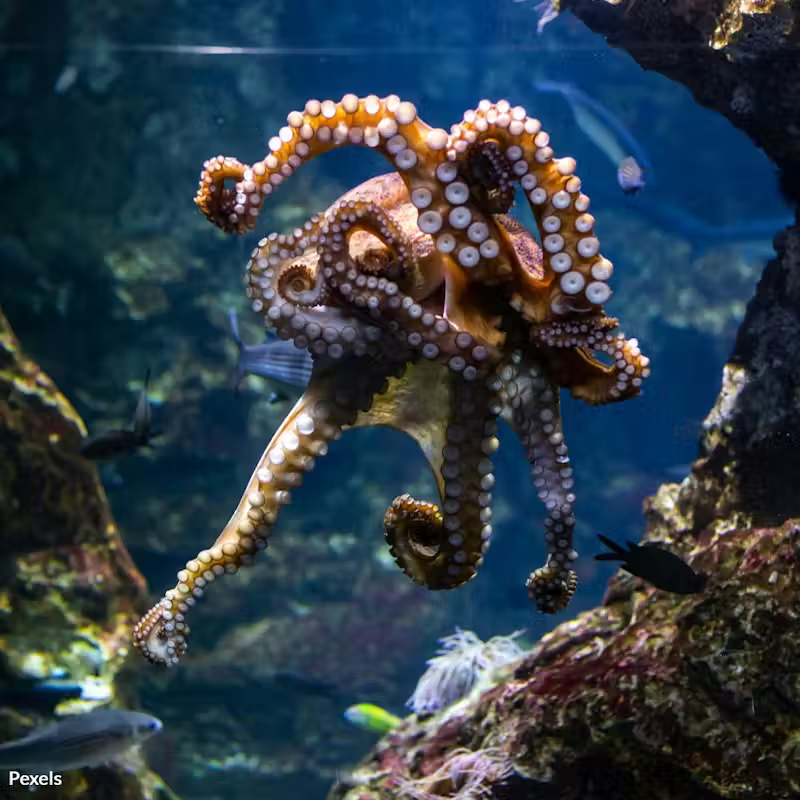Protect Intelligent Octopuses from Captivity and Exploitation
1,164 signatures toward our 30,000 Goal
Sponsor: The Animal Rescue Site
Stop the cruel and unsustainable practice of octopus farming in California—protect our intelligent marine friends and preserve the health of our oceans for future generations.

California stands on the brink of a significant shift in marine animal welfare with the proposed California Oppose Cruelty to Octopuses (OCTO) Act. This legislation seeks to ban octopus farming across the state, protecting these intelligent and complex creatures from the cruelties of aquaculture practices that they are not biologically equipped to handle.
Why Ban Octopus Farming?
Octopuses are among the most intelligent creatures in the ocean. They have the ability to solve puzzles, use tools, and exhibit complex behaviors indicative of their sentience and advanced cognitive functions1. In the wild, these creatures lead solitary lives, roaming freely and engaging in natural behaviors essential for their psychological well-being.
However, when placed in farming environments, octopuses face conditions that are starkly at odds with their intrinsic needs. They are confined in cramped spaces, subjected to high levels of stress, and unable to escape the proximity of other octopuses, leading to unnatural aggression and self-harm2. The mental stimulation they require cannot be replicated in a farm setting, leading to a diminished quality of life and often, premature death.
Environmental Concerns
Beyond the ethical implications, octopus farming poses severe environmental risks. The concentration of waste, use of chemicals, and potential for disease present in these aquaculture setups can lead to nutrient runoff, which contributes to algal blooms and oxygen-depleted zones harmful to marine ecosystems3. Such practices not only disrupt local wildlife but can also have cascading effects on marine biodiversity and the health of our oceans.
California's Role as a Leader in Animal Welfare
The OCTO Act represents a critical opportunity for California to lead by example in the global conversation on animal welfare and sustainable practices in the aquaculture industry. By banning octopus farming, California can prevent the inhumane treatment observed in other aquaculture operations and protect local environments from the detrimental impacts associated with intensive marine farming.
This legislation aligns with the state's long-standing commitment to environmental stewardship and compassion towards animals. It reflects the values of Californians who advocate for ethical treatment of all living beings and recognize the cognitive abilities and sentience of marine life4.
Join Us in Supporting the OCTO Act
The time to act is now. We must ensure that the OCTO Act passes to prevent the establishment of an industry that exploits intelligent, sentient creatures and threatens our marine ecosystems.
Sign this petition and voice your support for a future that respects the intrinsic value and well-being of all marine life, fostering a healthier, more ethical approach to our interactions with the ocean.
- Robyn White, Newsweek (22 February 2024), "California Might Ban Octopus Farming."
- Animal Legal Defense Fund (20 February 2024), "Octopus Farming Ban Introduced in California."
- Oliver Morrison, AgTechNavigator (26 February 2024), "Octopus farming: California becomes latest state to chew over ban."
- Will Conybeare, KTLA (20 February 2024), "Octopus farming ban introduced in California State Assembly."
The Petition:
To the California State Assembly and State Senate,
We, the undersigned, urge immediate support and passage of the California Oppose Cruelty to Octopuses (OCTO) Act. This crucial legislation seeks a full ban on octopus farming in California, a practice that not only causes immense suffering to these highly intelligent and sentient beings but also poses severe environmental risks.
Octopuses are known for their extraordinary cognitive abilities, including problem-solving, using tools, and showing emotional capacities. Confining these complex creatures in the restrictive environments typical of aquaculture operations leads to significant stress, aggression, and often fatal outcomes. The mental stimulation and space they require simply cannot be met within the confines of current farming practices.
Moreover, octopus farms generate environmental hazards such as nitrogen and phosphorus runoff, contributing to algal blooms and dead zones that disrupt marine ecosystems. The use of antibiotics and pesticides common in these operations further threatens marine biodiversity and the health of surrounding habitats.
By supporting the OCTO Act, we are taking a stand against cruelty and environmental degradation. This legislation not only protects octopuses but also sets a precedent for the humane treatment of all marine life. It leads us toward a future where the welfare of all creatures and the health of our environment are prioritized.
Sincerely,